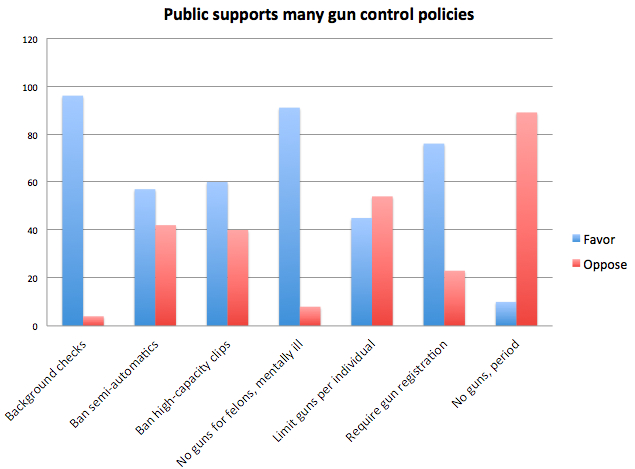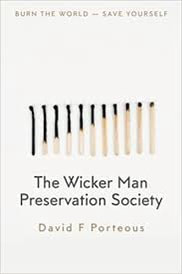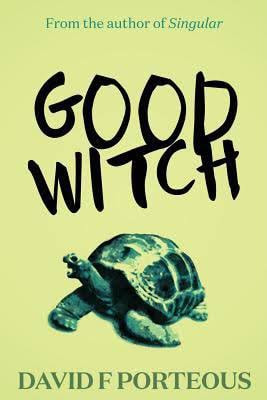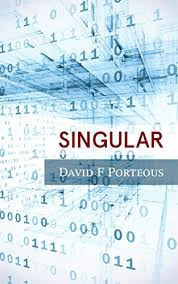dfpiii.com |
The website of David F Porteous |
|
You'll have heard about the incident at a school in Newton Connecticut where a man shot and killed 20 children, six adults and himself - after shooting his mother at her home. I remember the Dunblane shootings - we listened to the news reports on the radio while in our Maths class - and those events seem as surreal to me now as they did at the time. As a writer, I often have my characters do terrible things and I try to understand the world - as I'm sure many of us do - through the lens of my art; because understanding why things happen is important to make us feel safe - even if safety is an illusion - and help us prevent the same incident occuring again. Although it seems that such events, at stark angles to our normal lives, are becoming increasingly common. I want to talk about four different things, but three of them only briefly. Access to guns, mental health, the media and some of the opinions around gun control in the United States. Access to GunsThe United States has the most famous pro-gun policy in the world. At the heart of its constitution, right after the guaranteed right to freedom of expression, is the Second Amendment, which says: "A well regulated Militia, being necessary to the security of a free State, the right of the people to keep and bear Arms, shall not be infringed". This law has been generally interpreted as meaning that an individual in the United States should be allowed to own and carry a gun. This is, of course, not what the amendment actually says. The requirement is for a well regulated militia and the purpose is for the security of a free state - while war with Britain and France (and Spain and Mexico and the Native American Nations, etc.) was still a likely prospect it was a sensible precaution to ensure that militias could be formed and would be effective. I think it's worth pointing out that after the US won its independence from Britain, Congress disbanded the army, such was their distrust in standing armies. Instead their intention was that militias would protect the United States. The wars with the Native American Nations prompted the United States to finally create a standing army, but it's fair to say that this was not their first choice. It is in this context which the Second Amendment needs to be viewed and in this context it's clear - to me at least - that the law's intention was not to put a gun in every waistband in perpetuity. But that is a moot point because, as I said, the interpretation of the law for at least the last fifty years has been to guarantee individual rights to weapons. I've been to America several times now and have visited nine states for varying lengths of time. During one trip to Pennsylvania I was taken to a gun store. A warehouse-sized building just outside of Pittsburgh, the variety of guns on display was impressive. These were not simply devices for killing - their was craftsmanship and artistry involved in making some of the weapons and the wooden boxes that held them. After looking through many of the displays, I was taken downstairs to a sound-proof room where I was given ear protectors and was talked through and shown the correct way to load, hold, aim and fire a gun. (Normally there would be protective goggles as well, but my glasses were sufficient). Then I picked my target sheet from a range of imaginative designs including aliens, muggers and animals - I chose five bulls-eye targets - and bought fifty rounds. As it turns out I'm a pretty good shot - if I had a gun, and I could see you, and I wanted to kill you, then you'd be dead. That's how guns work. The movies show hundreds of shots being fired and almost nobody ever getting hit - that's what happens in a war zone, when the other guys are firing back and everybody's hiding behind a rock. Otherwise, it's easy to shoot something. You don't need hundreds of hours of practice to be lethal - I'm not even good at 'Call of Duty'. The experience solidified for me a very simple belief - people shouldn't have guns. I enjoyed the shooting range, I found the gun itself to be a palpably powerful thing; an extention of my will that almost became alive when fired - it was visceral. As a result I have never been more keenly aware of how incredibly dangerous both guns and the experience of using guns are. A gun is the simplest, easiest way for an unstable individual to actualise their insanity. I'm not clear that it's terribly useful for anything else. Certainly widespread gun ownership doesn't make the general population safer. More guns equals more murders using guns. Fact. The Harvard Injury Control Centre's review of studies on the subject concluded: "A broad array of evidence indicates that gun availability is a risk factor for homicide, both in the United States and across high-income countries... We found that states with higher levels of household gun ownership had higher rates of firearm homicide and overall homicide. This relationship held for both genders and all age groups, after accounting for rates of aggravated assault, robbery, unemployment, urbanization, alcohol consumption, and resource deprivation." - The Harvard Injury Control Centre More guns = more murders with guns. Frequently the argument against gun control is that there are only estimates of the number of guns in the United States. Millions of guns are registered to individuals, but that isn't all of them (by the way, most mass murders have been committed with legally-owned weapons). How would those guns be recovered from a population that doesn't want to give them up? The answer to that question comes down to political will. And the answer should be: one at a time, if necessary. I want to talk about some broader but related themes, but I felt it was necessary to begin with this. The facts say that the more guns in a society, the more of its people will be murdered using guns. I do not ask this question rhetorically - why isn't that enough for the US to ban guns? Mental HealthThe blogosphere produces an abundance of material in the wake of all these incidents. Grief. Outrage. Fear. Hate. Human emotions made digital broadcast media - doing credit to neither human emotion or digital broadcast media. But while I strongly believe that reducing the number of guns will reduce the number of deaths caused by guns, there are also undeniable mental health issues that need to be discussed. I do not know if we have more people today who have mental health problems, or if we are only now recognising the breadth of the human condition, but in either case our approach to managing mental health issues needs to be rethought. Just as we would promote exercise and healthy eating for long-life, we should also promote positive behaviour that affects our minds and our societies. "For fifty years we've aimed relentlessly at higher incomes. But despite being much wealthier, we're no happier than we were five decades ago. At the same time we've seen an increase in wider social issues, including a worrying rise in anxiety and depression in young people. It's time for a positive change in what we mean by progress." - Action for Happiness Action for Happiness highlight the growing problems of society and promote individual and collective behaviours to address these. Now, I'm a solid red socialist, so I think societies with really poor people and really rich people are inherently unstable - I believe that we need to make the poor richer and the rich poorer and that everyone would be happier living in that society. But Action for Happiness wants to promote different ways of thinking about our society other than just income - and support their goals. In addition to general, social unwellness, there's the issue of how you deal with the individual. How do you prevent a child with mental health issues growing up to become a murderer? This is a question of self-interest as much as altruism. And answering that question must involve money. A blogger calling herself "The Anarchist Soccer Mom" wrote recently and vividly about the problems of raising a son who has not so far been treated effectively for his mental health problems. A short excerpt, then the link below, the full piece really is excellent. "I live with a son who is mentally ill. I love my son. But he terrifies me. A few weeks ago, Michael pulled a knife and threatened to kill me and then himself after I asked him to return his overdue library books. His 7 and 9 year old siblings knew the safety plan—they ran to the car and locked the doors before I even asked them to. I managed to get the knife from Michael, then methodically collected all the sharp objects in the house into a single Tupperware container that now travels with me." - Thinking The Unthinkable, The Anarchist Soccer Mom Mental health is no longer something we can ignore. As we all live longer and managing dementia becomes a universal concern, as more of us are living alone and in virtual worlds rather than real communities, as the number of young children recognised as having mental health problems increases - we need to be explicit about what our strategies are for dealing with this. What are our 'five a day' for mental health? How do we, as a society, deal with children like Michael? If we don't have a plan, we probably need to build a lot more prisons. The MediaThe media get blamed for "sensationalising" mass murder. Now, I don't believe there is enough news to justify 24-hour news channels and I don't think those news channels do enough to explain real news issues in a way that is useful for society - there are exceptions, but that is the rule. However the specific charge I've seen put is that mass murders are made famous by the news and this encourages further murderers. We've all heard of copy-cat crimes - so we know that some crimes do prompt others to change their behaviour. Whether it actually makes people commit crimes or just changes the nature of the crimes they would commit anyway is hard to say. But it seems to me that there was a conscious decision made by the murderer in Connecticut (whose name I chose not to write) to leave the house, after killing his mother, to achieve some other goal. Perhaps he simply wanted the world to acknowledge his existence at all - speculation. It seems that we gain nothing by promoting a particular killer's brand and there is some logic to the notion that forming a league table of mass murderers, filling the airwaves with stories about mass murderers, writing gruesome stories and making films about mass murderers - all this surely must have an effect. This view, which is only that: I present no data, is controversial. In particular the computer games industry denies that violet games make children violent. The film industry denies that their product sexualises children. Producers of content wish to be divorced from the consequences consumers of interpreting content - is that possible? Ideas have set countries on fire - history is full of examples - and while sometimes those ideas are liberty, egality and fraternity, sometimes they are about the rise of a master race. Children are, apparently, having sex younger than ever before. And those kids who used to be on a PlayStation in their bedroom are now the ones piloting drones. Is there a defined end to individual responsibility? And if not, as an advocate of free speech, how do I square that? Opinions on Gun ControlSince 1993 the Pew Research Centre has been tracking opinions about guns - asking respondents whether it's more important to control gun ownership or protect the rights of Americans to own guns. In 2000, 66% of Americans said gun control was more important - the highest the suvery had ever recorded. However, since around 2010 those feelings have been about equal - it would seem that the US is divided on the issue. Ezra Klein's excellent Washington Post Wonkblog post cites Pew and a number of other sources and is well worth reading. Pew's research is matched by the GALLUP poll which Klein references on whether Americans favour a) stricter gun control or b) same / less strict gun control. Most Americans now appear to favour the same / less. I'm pretty sure that most Americans don't know what current gun control law is. And I think that because a) the massive opposition to gun control laws has meant the law has been specific rather than sweeping, state-by-state rather than national and thus obscure - and b) most people don't know what the law says on anything. Have you ever played monopoly with a group of strangers and argued about what happens when you land on Free Parking? Imagine that, but with fifty different sets of rules depending on where you're sitting in the room - that's gun control legislation in the US. What I think has changed over the polling periods of both these surveys is what people believe gun control law is. The rhetoric of the pro-gun lobby (while the people at Fox News bang every drum, every box, every tin and trash can just because they like the noise) has made people think that every democrat candidate is poised outside of their door, ready to steal their guns at a moment's notice, then release a gang of angry black men to ravage the nation's white haired grandmothers. In fact a huge amount has been talked about gun control, but very little has been achieved. When people are asked about whether they support specific measures, rather than more measures, the responses are different: (I've taken that graph directly from the Wonkblog. I'm not entirely sure what the law is on copyright - though I'm fairly sure we need more of it, or possibly less - so let me know if citing the source and linking back isn't enough.)
Firstly, I'm curious about the ~7% of people who want to give guns to convicted criminals and the mentally ill. Are 7% of Americans criminals and / or mentally ill? Because that's the only way that makes sense. But what's clear from this is where an actual policy has been seriously discussed (and implemented), the majority of people are in favour of it. I think progress on the gun control issue needs to be framed in the form - "there's really not all that much gun control" and then "here's some specific things we think need to be done". I'm glad people are being polled on the issues, and I understand that most Americans feel owning a gun is a right. I don't believe most Americans understand that owning guns makes them less safe, rather than more. I don't believe most Americans know what current law is. And I think that there will come a spasm of knee-jerk reactions motivated by fear and divorced from reason. (Let's make sure all teachers carry guns, let's give children gun training to make them safe from bullets). Finally I think there is some collective responsibility that everyone needs to take for this. One man always has his finger on the trigger, but every man emerges from a time in which he wasn't a killer, where perhaps he was a child with undiagnosed or untreated medical problems, and at that time perhaps a better community or a better society could have changed his path. Newtown Youth & Family Services is a local non-profit directly assisting the families involved in the Newtown shootings. You can donate via their website using paypal.
2 Comments
22/8/2013 03:47:47 am
The attacks in schools are common in US and most of these cases are leading to persons with mental disorders. The news that you shared above was shocking and he took twenty innocent lives. Thank you for discussing about the incident.
Reply
Leave a Reply. |




